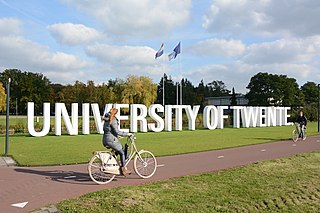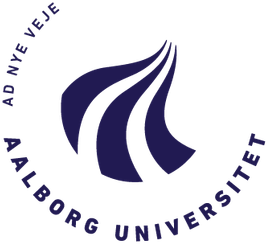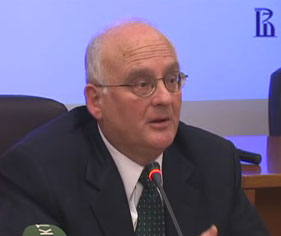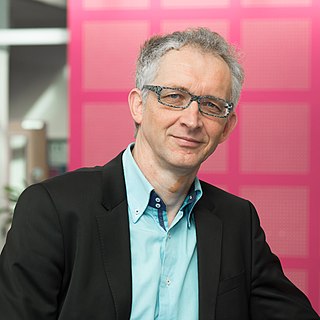Related Research Articles

The University of Twente is a public technical university located in Enschede, Netherlands. The university has been placed in the top 170 universities in the world by multiple central ranking tables. In addition, the UT was ranked the best technical university in The Netherlands by Keuzegids Universiteiten, the most significant national university ranking. The UT collaborates with Delft University of Technology, Eindhoven University of Technology and the Wageningen University and Research Centre under the umbrella of 4TU and is also a partner in the European Consortium of Innovative Universities (ECIU).

Aalborg University (AAU) is a Danish public university with campuses in Aalborg, Esbjerg, and Copenhagen founded in 1974. The university awards bachelor's degrees, master's degrees, and PhD degrees in a wide variety of subjects within humanities, social sciences, information technology, design, engineering, exact sciences, and medicine.

The University of Aveiro is a public university, in addition to providing polytechnic education, located in the Portuguese city of Aveiro. Founded in 1973, it has a student population of approximately 12,500, distributed among 58 graduate, 40 Masters of Science and 25 PhD programs, distributed by departments and autonomous sections, with specialized faculties. It is a Research & Development university, with research departments developing programmes in fundamental and applied mathematics, physics, chemistry, telecommunications, robotics, bioinformatics, sea sciences, materials, design, business administration and industrial engineering.
Comparative education is a discipline in the social sciences which entails the scrutiny and evaluation of different educational systems, such as those in various countries. Professionals in this area of endeavor are absorbed in advancing evocative terminologies and guidelines for education worldwide, enhancing educational structures and producing a context to which the success and effectivity of education programs and initiatives can be assessed.
The Academy of Social Sciences is a representative body for social sciences in the United Kingdom. The Academy promotes social science through its sponsorship of the Campaign for Social Science, its links with Government on a variety of matters, and its own policy work in issuing public comment, responding to official consultations, and organising meetings and events about social science. It confers the title of Fellow upon nominated social scientists following a process of peer review. The Academy comprises over 1000 Fellows and 41 learned societies based in the UK and Europe.
Miguel Angel Escotet is a social scientist, education administrator and author, emeritus professor at the University of Texas at Brownsville, of which he was dean of the College of Education. He was also secretary general of Organización de Estados Iberoamericanos and professor at Florida International University. He is since 2014 director general of corporate social responsibility of Abanca. He is also president of Fundación Galicia Obra Social, Afundación, and president of IESIDE, Afundacion's business school.
Harold J. Noah was an American educator, whose research and writing have focused on comparative education and economics of education. He was born in London, England, and moved to the United States in 1958. His higher education began at the London School of Economics and King’s College, University of London, and was followed by a Ph.D. at Teachers College, Columbia University. He served as Professor at Teachers College, Columbia, from 1964 to 1987. He was appointed to the Gardner Cowles chair in economics of education. He served as Dean of the College from 1976 to 1981. He is widely recognized as a distinguished authority in the field of comparative education.
Simon Schwartzman is a Brazilian social scientist. He has published extensively, with many books, book chapters and academic articles in the areas of comparative politics, sociology of science, social policy, and education, with emphasis on Brazil and Latin America. He was the President of the Brazilian Institute for Geography and Statistics (IBGE) and is a retired professor from the Federal University of Minas Gerais. He is member of the Brazilian Academy of Sciences, holder of the Grand Cross of the Brazilian Order of Scientific Merit (1996). He is currently associate researcher at the Institute for Studies in Economic Policy Instituto de Estudos de Política Econômica / Casa das Garças - Rio de Janeiro.
Robert W. Kates was an American geographer and independent scholar in Trenton, Maine, and University Professor (Emeritus) at Brown University.
Carlos Alberto Torres Novoa is a distinguished professor.
Alberto Acereda is a Spanish former professor who currently works as Associate Vice President in the Global Higher Education Division at Educational Testing Service (ETS) in Princeton, New Jersey. He provides overall leadership for business development initiatives and academic outreach in global and higher education. Previously at ETS he worked as Senior Director of Business Development and as senior strategic advisor to the Vice President and COO of higher education. Prior to joining ETS in 2012, he spent nearly twenty years at various universities and graduate programs across the United States.
The UCL Faculty of Social and Historical Sciences is one of the 11 constituent faculties of University College London (UCL). The current Executive Dean of the Faculty is Professor Jennifer Hudson, having been appointed from September 2022.

Philip G. Altbach is an American author, researcher and former professor at Boston College, and the founding director of the Boston College Center for International Higher Education.
Gary Marks is an American-based academic and an expert on multilevel governance and the European Union. He is a Burton Craige Distinguished Professor of Political Science at the University of North Carolina at Chapel Hill. He is also a recurring Research Fellow at the Robert Schuman Centre, EUI, Florence. Marks developed the concept of "multilevel governance.”

Roeland Jaap (Roel) in 't Veld is a Dutch scholar of public administration and Labour Party politician. He was briefly State Secretary for the Ministry of Education, Culture and Science in 1993.
Jacques J.A. Thomassen is a Dutch organizational theorist, Emeritus Professor of Political Science at the University of Twente, and member of the Royal Netherlands Academy of Arts and Sciences, known for his work on the theory of political and policy representation.

Franciscus Adrianus (Frans) van Vught is a Dutch social scientist and Professor of Higher Education Policy at the University of Twente, known for his work on the theory of higher education innovation, higher education policy and relationship between government and higher education.

Johannes Willem "Johan" Schot is a Dutch historian working in the field of science and technology policy. A historian of technology and an expert in sustainability transitions, Johan Schot is Professor of Global Comparative History at the Centre for Global Challenges, Utrecht University. He is the Academic Director of the Transformative Innovation Policy Consortium (TIPC) and former Director of the Science Policy Research Unit (SPRU) at the University of Sussex. He was elected to the Royal Netherlands Academy of Arts and Sciences (KNAW) in 2009.
Alan Christopher Walker, CBE, FBA, FRSA, FAcSS is a British academic, social scientist and public health administrator. Since 1985, he has been Professor of Social Policy and Social Gerontology at the University of Sheffield.

Simon Marginson is an Australian academic who researches higher education. He held professorships in education or higher education at Monash University (2000–06) and the University of Melbourne (2006–13) before moving to the United Kingdom as professor of international higher education at University College London (2013–18). As of 2021, he is the director of the ESRC/OFSRE Centre for Global Higher Education and professor of higher education at the University of Oxford.
References
- ↑ Slaughter, Sheila, and Larry L. Leslie. Academic capitalism: Politics, policies, and the entrepreneurial university. The Johns Hopkins University Press, 2715 North Charles Street, Baltimore, MD 21218-4319, 1997.
- ↑ Becher, Tony, and Paul Trowler. Academic tribes and territories: Intellectual enquiry and the culture of disciplines. McGraw-Hill International, 2001.
- 1 2 Burton R. Clark, (eds.) The Academic Profession: National, Disciplinary, and Institutional Settings, 1987. p. xi.
- ↑ Neave, Guy. "The supermarketed university: Reform, vision and ambiguity in British higher education." Perspectives: policy and practice in higher education 9.1 (2005): 17–22.
- ↑ Guy Neave; Director of Research, CIPES, Matosinhos, Portugal, Google Scholar Profile.